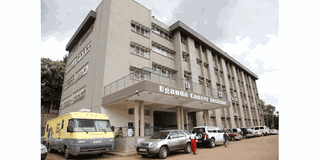UCI gets Shs310b for modern cancer machines

The Uganda Cancer Institute in Mulago National Referral Hospital. PHOTO/FILE
What you need to know:
- The number of new cases of cancer registered at the facility annually increased to 7,450 in 2021 from 3,500 in 2005, according to the UCI.
The government has earmarked Shs310 billion to purchase and install modern equipment for the diagnosis and treatment of cancer. Addressing journalists in Kampala yesterday, Dr Nixon Niyonzima, the head of research and training at the Uganda Cancer Institute (UCI), said they have so far received Shs250 billion.
He said the money will be used to buy a Positron emission tomography (PET) scan, a modern diagnostic machine that is used to determine the exact point the cancer is in the body.
“There is also a cyclotron machine. It is going to be the only one in the country, supplying the UPDF (Uganda People’s Defence Forces) Hospital and Lubowa Hospital and anybody who establishes a facility [to treat cancer] in Uganda,” Dr Niyonzima said.
He added that construction of the facility has been completed and “we are awaiting the delivery of this equipment which we will have before the end of this year.”
The lack of hi-tech equipment in the country is causing financial haemorrhage as families and sometimes the government take the sick abroad for treatment, with some that involve taxpayers’ money sparking criticisms from the public.
Some of the prominent officials who have succumbed to cancer in the country include the former Speaker of Parliament Jacob Oulanyah, who died in the US in March, and Gen Elly Tumwine who passed away on August 25 in Kenya.
Dr Niyonzima said the increase in hi-tech equipment to treat cancer will be a game changer in the fight against the disease.
“In the past, we had only one radiotherapy machine but we currently have four. We expect to get four more before the end of this year. So we will have a total of eight. Each machine will cost $4m (Shs15b),” he revealed.
Dr Jackson Orem, the head of UCI, said they are now able to provide around 80 percent of all types of medicines that cancer patients need.
“We have free medication available. The cancer patients in Uganda are the best treated in the entire East African region, if not, in Africa,” he said.
He added that UCI receives several patients from Kenya, Tanzania, Nigeria, Liberia, and Rwanda. At least 20 percent of patients handled at UCI are foreigners, according to information from the management.
“We are now experiencing reverse medical tourism where people who go to India for cancer treatment are referred back to UCI because we have the right treatment,” Dr Orem said.
Patients sleeping outside
The number of new cases of cancer registered at the facility annually increased to 7,450 in 2021 from 3,500 in 2005, according to the UCI.
“This rise in number increases demand at the facility. That is why you hear that there is congestion at the facility,” Dr Orem said.
He added: “Currently, the facility can accommodate 100 people. We need the private sector to come in and help.”
Some non-governmental organisations have been accommodating patients for years but the operators said they lack funds to accommodate everyone in need.
Dr Niyonzima said they plan to decongest UCI by establishing facilities and strengthening care in regional treatment centres. He said this year, they plan to start treating cancer patients in facilities being constructed in Mbale and Gulu.
“The first regional cancer centre to get the machines will be Gulu. It is the first custom cancer centre that was built. In the other facilities, we have been operating in buildings that were given by the regional referral hospitals,” he said.
He said they are expanding bed capacity at UCI Kampala from 120 to 360 beds.
“This is going to be in phases through the funding from the government. We expect that by June next year, this should be fully occupied and opened to our patients,” he said.




